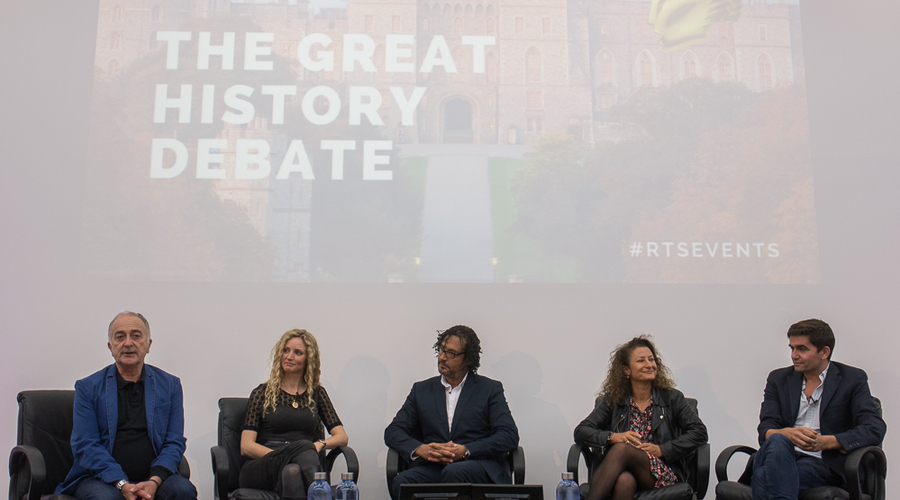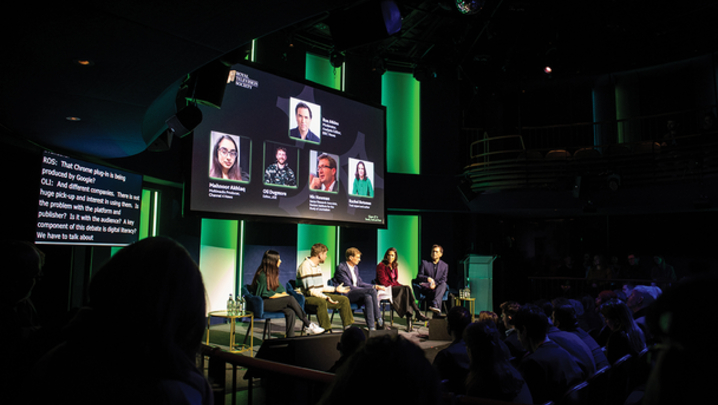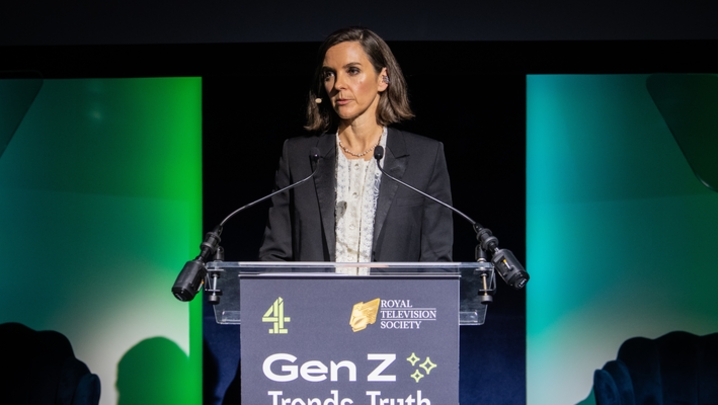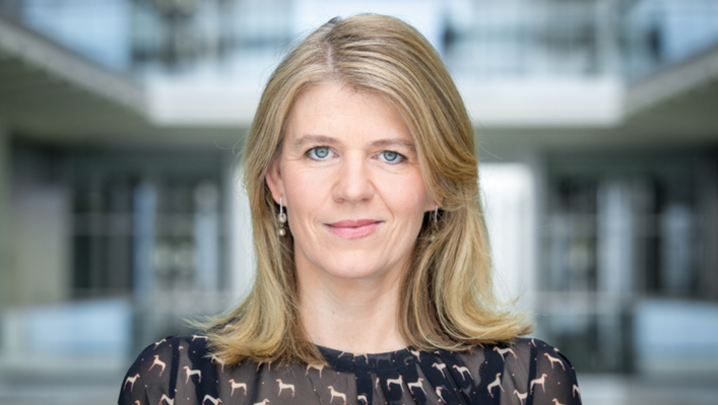Matthew Bell hears why TV is the ideal showcase for history
To paraphrase the renowned historian EH Carr’s question, what is TV history? Is it knowledgeable big beasts – David Starkey, Mary Beard, Simon Schama and Lucy Worsley among them – lecturing as they stride across the historical stage? Or is it “living history”, where modern-day Britons relive the experiences of their ancestors, as in The Victorian Slum? Or is it the long-running series Who Do You Think You Are?
Even the chair of a lively RTS early-evening event in early October, Sir Tony Robinson, was at a loss to explain. “I don’t know what history is,” he confessed. “To me, it’s a bit like comic timing – I know how it works and I know what people’s reactions to it are, but, precisely what it is, I haven’t a clue.”
Robinson was well-qualified to host the event: as well as playing Baldrick in the BBC’s classic historical comedy Blackadder, he was also the host of Channel 4’s archaeology series Time Team, which ran for 20 years until 2014.
Helping Robinson assess the current state of TV history was a panel of two TV historians, a programme-maker and a commissioner.
The consensus was that British TV makes great history programmes in a multiplicity of styles – but not enough of them. “Genres go through cycles and I feel a lack of confidence about the genre, at the moment, across British broadcasting,” said the BBC’s history commissioner, Tom McDonald.
As head of specialist factual and natural history, he commissions a wide spread of shows for the corporation. He praised the efforts of his rivals: “When Channel 4 does history, it does it very well and differently to us; Channel 5 does some really fantastic history.” But “the ecosystem only works if everyone is doing it”.
He continued: “I don’t worry about finding the next generation of on-screen historians. I worry about the next generation of programme-makers, because they can only become experienced history programme-makers by being a researcher, an assistant producer and then a director on history programming.
“If there’s less of it and [history] just becomes the role of the BBC, you won’t have the plurality of voices that I think history programming needs to thrive.”
The genre’s future seems secure at the BBC, at least. “I still have an incredibly healthy amount of money to spend on history, and that means I can commission a huge range of history content across a year,” said McDonald.
He explained that he wanted to “reach the biggest, broadest audience possible, and convince them that this is history content which will speak to them, resonate with them and, most importantly for me, might reveal something to them about the now.”
“Thank God for the BBC,” said Wall to Wall boss Leanne Klein. “There has been a complete lack of confidence in history on a lot of our British channels, certainly for the past five years.”
She said that ITV had stopped taking history shows and Channel 4 “doesn’t commission much history any more, compared with the Time Team and 1900 House days. We were making hours and hours of history for Channel 4 and it’s really hard now to find a story that they want to tell.”
Historian and broadcaster David Olusoga argued that, despite airing fewer history programmes, television had a “pretty healthy ecosystem of different approaches that allow us to tell almost any story we can imagine”.
Olusoga talked about the British people’s enthusiasm for history, which is reflected in the huge number of visits they make to cathedrals and stately homes, and the growing number of history festivals.
“My frustration is that we’ve not managed to harness this huge energy and appetite for the past,” said the historian, who, with Schama and Beard, will present Civilisations, a new BBC Two series, next year.
“I’ve also been frustrated that there are histories that we do not tell. We’ve spent a lot of time, in my experience, telling the same stories over and over again.” He said that the stories of women and Britain’s relationship with the outside world had been neglected.
Despite its present difficulties, Klein was positive about the genre’s future: “History is telling stories about the past and there are a huge number of stories to tell. I don’t think we’ve even scratched the surface.” The Wall to Wall chief executive said that most of her indie’s current output told “women’s stories or the stories of groups of people who have never had a voice”. Although a “bleak watch”, Klein ascribed the popularity of The Victorian Slum to the fact that “a lot of people know they come from that background”. She added: “We don’t tell ordinary people’s stories enough.”
History academic and presenter Suzannah Lipscomb pointed to The Great Fire, which she presented with fellow historian Dan Jones and engineer Rob Bell for Channel 5, as another series that concentrated on normal people rather than the great and the good. “We were looking at the ordinary lives of the people involved, moving street by street through the fire, hour by hour. I felt like it really brought it to life,” she said.
Lipscomb continued: “If you think of history as lived experience, then it suddenly feels different. You think of what it might be like to be that shoemaker whose house is about to be burnt down. That’s a powerful way to tell a story.”
“The range of forms we deliver history content in is probably broader than it’s ever been,” argued the BBC’s McDonald. “It’s an incredibly rich time for history programme-makers.”
The most popular shows in the BBC history slate over the past few years had been “living history” series, he said, largely because they were “experiential and immersive”, and offered “emotion” as well as historical content.
The corporation’s output, he continued, was now “pivoting more towards the 20th century, which is not to the exclusion of the centuries that went before, but one of the BBC’s jobs is to be the broadcaster of record. We are at a key moment, when there is a generation of people who are about to pass away who, I think, have not necessarily told their stories. I feel a huge responsibility to capture and tell those stories.”
Another of his favourite avenues was looking at “familiar periods of history through a narrower aperture”, explained McDonald. Elizabeth I’s Secret Agents, the first part of which aired at the end of October, examined the reign of the Tudor monarch through “the prism of the spy network that underpinned her reign”.
Lipscomb proposed that there had also been a renaissance in authored history. “If you’ve got someone who’s a very good historian and broadcaster, who’s telling a very good story, that’s sometimes all the audience wants,” she said, mentioning Schama, Beard, Jones and Bettany Hughes.
Television and history, agreed the panel, were perfect bedfellows. “I became a historian not because my history lessons at school were that fantastic, it’s sad to say, but because I came home and I watched history on television,” revealed Olusoga. “I am a historian because of television.
“I don’t think any medium can tell these stories, or bring them to life or make people care anywhere near as well as television. It’s the greatest storytelling medium that there is.”
‘The Great History Debate’ was an RTS early-evening event held in central London on 10 October. It was produced by Sally Doganis and Andrew Scadding.
Getting the message across: Emotions vs expertise
Wall to Wall is currently making series 15 and 16 of Who Do You Think You Are? for the BBC. Is it a history programme? Perhaps not in the strict sense, but history is at its core.
The series, argued the indie’s boss, Leanne Klein, takes people ‘on a journey into their own ancestry and, through that, it’s incredibly moving. It’s also an amazing history magazine show by default, because you get little bits of history on BBC One at 9:00pm on a Thursday night that you would never get [otherwise].
‘What we’re here to do is to move people to learn more about history. I don’t think television is a great place to give people information; I think it’s a great place to interest and engage them in something. And the best way to do that is to give people an emotional experience, whether they’re laughing or crying or shouting.
‘In the end, I don’t think you can engage people – and I know this may be controversial – by two historians having a row on television. It’s never going to engage people like someone actually learning something about the past that is meaningful to them.’
The BBC’s Tom McDonald accepted that Who Do You Think You Are? was a ‘brilliant engine both for unfamiliar and familiar history’, but argued that there was a place for experts on television.
Referring to BBC Two’s The Last Days of Anne Boleyn, which featured panellist Suzannah Lipscomb, David Starkey and historical novelist Hilary Mantel among its cast of experts, he argued that ‘a multiplicity of voices giving multiple perspectives’ could make for a riveting programme.
‘Hearing five people debate Anne Boleyn is trying to do exactly the same thing [as Who Do You Think You Are?], which is to bring the people of the past, and the past itself, back to life,’ said McDonald.
He continued: ‘A discussion where you try and turn a figure in history into flesh and blood, where you can vividly imagine what that person might have been like… is something that television is actually rather good at, but also that I, genuinely, think you can bring a very big audience to.’
David Olusoga argued that such an approach ‘only works if those historians really, really care’. Starkey, he said, was such a historian.
‘When I watch somebody who really cares about the people from the past that they’re talking about, their emotion is infectious,’ said Olusoga. ‘History on TV can make you touch people from the past, at its best. I don’t think it teaches you the facts but it does teach you to care and then maybe go out and buy a book or go to Hampton Court Palace.’
‘The viewing figures for The Last Days of Anne Boleyn show that people are interested [in this approach] – lots of people watched it,’ said Lipscomb.
The show attracted 3 million viewers in its 9:00pm slot, according to Barb’s overnight figures. It beat the opposition on BBC One, Britain’s Biggest Hoarders, and made the argument that high-quality genre programming can win large audiences in primetime.
The Last Days of Anne Boleyn, suggested Lipscomb, offered both emotion and experts – perhaps the ideal combination for a history programme. ‘Emotion is important, and that comes from historians who really engage with and know their material,’ she said.







